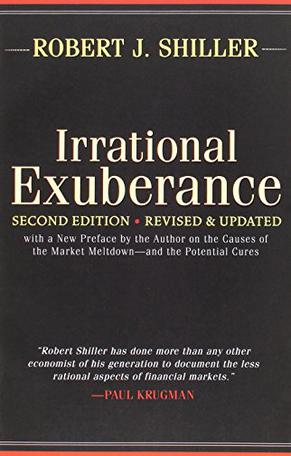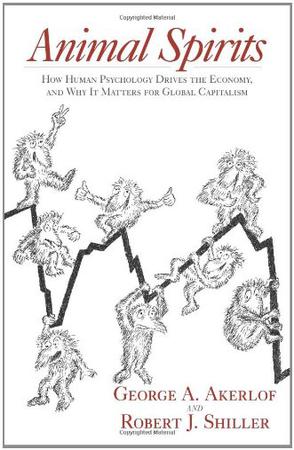欢迎来到相识电子书!
标签:RobertShiller
-
Irrational Exuberance
《非理性繁荣》书名取自美国联邦准备理事会理事主席葛林史班 1996 年底在华府希尔顿饭店演讲中,谈到当时美国金融资产价格泡沫时所引用的一句名言。从那时起,许多学者、专家都注意到美国股市因投机风气过盛而引发的投资泡沫现象。 Book Description In this timely and prescient update of his celebrated 2000 bestseller, Robert Shiller returns to the topic that gained him international fame: market volatility. Having predicted the stock market collapse that began just one month after the first edition was published, he now expands the book to cover other markets that have become volatile, particularly the recently red-hot housing market. He includes a full chapter on domestic and international housing prices in historical perspective. Shiller amasses impressive evidence to support his argument that the recent housing market boom bears many similarities to the stock market bubble of the late 1990s, and may eventually be followed by declining home prices for years to come. After stocks plummeted when the bubble burst in 2000, investors moved their money into housing. This precipitated the inflated real estate prices not only in America but around the world, Shiller maintains. Hence, irrational exuberance did not disappear—it merely reappeared in other settings. Building on the original edition, Shiller draws out the psychological origins of volatility in financial markets, this time folding real estate into his analysis. He broadens the evidence that investing in capital markets of all kinds in the modern free-market economy is inherently unstable—subject to the profoundly human influences captured in Alan Greenspan’s now-famous phrase, “irrational exuberance.” As was true of its predecessor, the second edition of Irrational Exuberance is destined to be widely read, discussed, and debated. Amazon.com CNBC, day trading, the Motley Fool, Silicon Investor--not since the 1920s has there been such an intense fascination with the U.S. stock market. For an increasing number of Americans, logging on to Yahoo! Finance is a habit more precious than that morning cup of joe (as thousands of SBUX and YHOO shareholders know too well). Yet while the market continues to go higher, many of us can't get Alan Greenspan's famous line out of our heads. In Irrational Exuberance, Yale economics professor Robert J. Shiller examines this public fascination with stocks and sees a combination of factors that have driven stocks higher, including the rise of the Internet, 401(k) plans, increased coverage by the popular media of financial news, overly optimistic cheerleading by analysts and other pundits, the decline of inflation, and the rise of the mutual fund industry. He writes: "Perceived long-term risk is down.... Emotions and heightened attention to the market create a desire to get into the game. Such is irrational exuberance today in the United States." By history's yardstick, Shiller believes this market is grossly overvalued, and the factors that have conspired to create and amplify this event--the baby-boom effect, the public infatuation with the Internet, and media interest--will most certainly abate. He fears that too many individuals and institutions have come to view stocks as their only investment vehicle, and that investors should consider looking beyond stocks as a way to diversify and hedge against the inevitable downturn. This is a serious and well-researched book that should read like a Stephen King novel to anyone who has staked his or her future on the market's continued success. --Harry C. Edwards From The New Yorker During the past decade, he has emerged as a leader in the new field of "behavioral finance" which seeks to apply lessons learned from other academic disciplines, particularly psychology to economics. Irrational Exuberance is not just a prophecy of doom. Encompassing history, sociology, and biology, as well as psychology and economics, it is a serious attempt to explain how speculative bubbles come about and how they sustain themselves. John Cassidy From Library Journal Taking his book's title and thesis from Alan Greenspan's 1996 description of investors, Shiller (economics, Yale Univ.) studies the current booming U.S. stock market in historical terms. His research into past U.S. and international markets indicates that during every speculative bubble there was always widespread consensus that high valuations were justified by each market's special circumstances. Every large market correction seemed to result from popular consensus rather than specific events or news. Shiller says that past bull and bear markets, though often based initially on sound fundamental reasoning, fed upon themselves to go beyond what the facts justified. He challenges the efficient market theory, demonstrating that markets cannot be explained historically by the movement of company earnings or dividends. He concludes that the current U.S. stock market is a speculative bubble awaiting correction. While the book certainly belongs in all academic business collections, public libraries should also purchase it as a counterweight to the plethora of get-rich-quick investment guides. -Lawrence R. Maxted, Gannon Univ., Erie, PA From The New York Times Book Review No one has explored the strange behavior of the American investor in the 1990's with more authority, or better timing, than Robert J. Shiller. Louis Uchitelle About Author Robert J. Shiller is the Stanley B. Resor Professor of Economics at Yale University. He is the recipient of the 2000 Commonfund Prize, awarded for Best Contribution to Endowment Management Research, for Irrational Exuberance. He is also the author of Market Volatility and Macro Markets, which won the 1996 Paul A. Samuelson Award. Book Dimension : length: (cm)23.3 width:(cm)15.4 -
Animal Spirits
Review White House Budget Director Peter Orszag is a numbers guy, a propeller head as President Obama would say. But as David Von Drehle and I write in this week's print version of Time, Orszag has been spending his time recently reading not about spreadsheets, but about psychology. In particular, he has been reading a new book by the economists George Akerlof and Robert Shiller called Animal Spirits: How Human Psychology Drives The Economy, and Why It Matters For Global Capitalism. . . . We are, it turns out, slaves to the Animal Spirits. They have brought us to our knees. And now they are the only things that can save us. (Michael Scherer, Time.com's "Swampland" ) In their new book, two of the most creative and respected economic thinkers currently at work, George Akerlof and Robert Shiller, argue that the key is to recover Keynes's insight about 'animal spirits'--the attitudes and ideas that guide economic action. The orthodoxy needs to be rebuilt, and bringing these psychological factors into the core of economics is the way to do it. . . . The connections between their thinking on the limits to conventional economics and the issues thrown up by the breakdown are plain, even if they were unable to make every link explicit. Even more than Akerlof and Shiller could have hoped, therefore, it is a fine book at exactly the right time. . . . Animal Spirits carries its ambition lightly--but is ambitious nonetheless. Economists will see it as a kind of manifesto. (Clive Crook Financial Times ) Animal Spirits is a welcome addition to our Hannitized national economic debate, in which anyone who advocates government spending risks being labeled a socialist. . . . Animal Spirits is most compelling when the authors summon all the key behavioral patterns to explain vast, complex phenomena such as the Great Depression. . . . Animal Spirits . . . [is] aimed squarely at the general reader, and rightly so: Macroeconomics is now everybody's business--the banks are playing with our money. (Andrew Rosenblum New York Observer ) [A] lively new financial crisis book. (James Pressley Bloomberg News ) The two superstars have produced a truly innovative and bold work that attempts to show how psychological factors explain the origins of the current mess and offer clues for possible solutions. At a time when plummeting confidence is dragging down the market and the economy, the authors' focus on the psychological aspect of economics is incredibly important. (Michael Mandel BusinessWeek ) What Sigmund Freud did for the study of the mind, George Akerlof and Robert Shiller are doing for economics. Freud, healer or fake--take your pick--built a career and a field of medicine on the idea that people are driven by irrational forces. Akerlof, professor of economics at the University of California, Berkeley and winner of the 2001 Nobel Prize in economics, and Shiller, the Yale economist who is the eminence grise of the housing meltdown, argue that massive government market intervention programs are the only way to turn fear into enthusiasm for spending and investing--the 'animal spirits' that are an essential part of recovery. . . . Akerlof and Shiller pick up on the idea of the emotional impetus to investment. With elegant reasoning and lovely prose, they demonstrate that we'll all be wallowing in misery unless governments around world, especially the in the G7 nations, help to return markets to optimism. . . . Animal Spirits is a fine discussion of the last few decades of development of economic theory, especially monetary economics. (Andrew Allentuck The Globe & Mail ) Another contribution to the human-nature-ensures-economics-is-irrational school of thought. But, unlike many of the rants against people trying to make an honest profit, this is a measured examination of how the present crisis is explained in economic terms. And so it should be. George Akerlof is a Nobel prizewinner, Robert Shiller teaches at Yale and is the author of Irrational Exuberance, which should give you an idea of this one's approach. This fascinating work uses economics to explain real-life issues, such as real estate price cycles, to key policy problems, such as the relationship between inflation and employment. (Stephen Matchett The Australian ) With Animal Spirits we hone in on how incentives and narratives can be created to channel the human psychological factor into collectively healthy directions, and how to be aware of the fictions we tell ourselves about how we wish the world and greed and financial security worked. [Animal Spirits] sheds light on complex issues and leaves readers with a better grasp of undercurrents and--most importantly--a rediscovered belief in principles of common sense and caution. (Daily Kos ) The new book from George Akerlof and Robert Shiller, Animal Spirits, has been getting a lot of press of late, and quite rightly: it's really good. It's not only very readable; it also offers a compelling vision of a very different type of macroeconomics--one where behavioral considerations are front and center, rather than simply providing what Clive Crook calls 'ad hoc modifications' to the standard, ridiculously oversimplified and unrealistic, model. . . . [I]f you read only one book on this subject, make it Animal Spirits. (Felix Salmon, Portfolio.com ) As George Akerlof and Robert Shiller show in a new book Animal Spirits, this is no freak storm. It may mark the long-awaited encounter between psychology and economics. . . . Akerlof and Shiller's book is probably the first macroeconomic exploration of the subject that is accessible to those interested in the subject but who don't have the academic training to understand the detailed argument. (Mint ) Review This book is a sorely needed corrective. Animal Spirits is an important--maybe even a decisive--contribution at a difficult juncture in macroeconomic theory. (Robert M. Solow, Nobel Prize-winning economist )
热门标签
下载排行榜
- 1 梦的解析:最佳译本
- 2 李鸿章全传
- 3 淡定的智慧
- 4 心理操控术
- 5 哈佛口才课
- 6 俗世奇人
- 7 日瓦戈医生
- 8 笑死你的逻辑学
- 9 历史老师没教过的历史
- 10 1分钟和陌生人成为朋友


